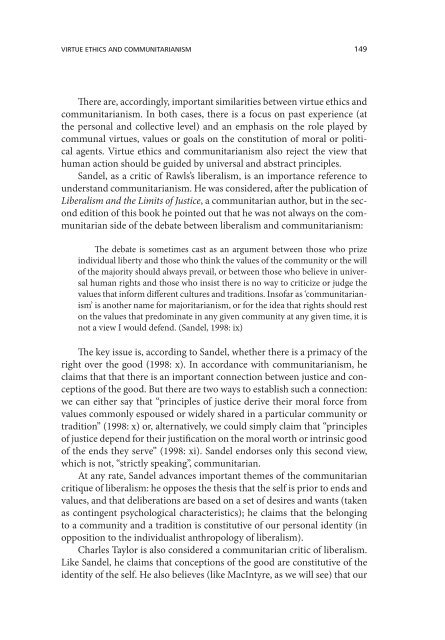Diacritica 25-2_Filosofia.indb - cehum - Universidade do Minho
Diacritica 25-2_Filosofia.indb - cehum - Universidade do Minho
Diacritica 25-2_Filosofia.indb - cehum - Universidade do Minho
Create successful ePaper yourself
Turn your PDF publications into a flip-book with our unique Google optimized e-Paper software.
VIRTUE ETHICS AND COMMUNITARIANISM<br />
149<br />
Th ere are, accordingly, important similarities between virtue ethics and<br />
communitarianism. In both cases, there is a focus on past experience (at<br />
the personal and collective level) and an emphasis on the role played by<br />
communal virtues, values or goals on the constitution of moral or political<br />
agents. Virtue ethics and communitarianism also reject the view that<br />
human action should be guided by universal and abstract principles.<br />
Sandel, as a critic of Rawls’s liberalism, is an importance reference to<br />
understand communitarianism. He was considered, aft er the publication of<br />
Liberalism and the Limits of Justice, a communitarian author, but in the second<br />
edition of this book he pointed out that he was not always on the communitarian<br />
side of the debate between liberalism and communitarianism:<br />
Th e debate is sometimes cast as an argument between those who prize<br />
individual liberty and those who think the values of the community or the will<br />
of the majority should always prevail, or between those who believe in universal<br />
human rights and those who insist there is no way to criticize or judge the<br />
values that inform diff erent cultures and traditions. Insofar as ‘communitarianism’<br />
is another name for majoritarianism, or for the idea that rights should rest<br />
on the values that pre<strong>do</strong>minate in any given community at any given time, it is<br />
not a view I would defend. (Sandel, 1998: ix)<br />
Th e key issue is, according to Sandel, whether there is a primacy of the<br />
right over the good (1998: x). In accordance with communitarianism, he<br />
claims that that there is an important connection between justice and conceptions<br />
of the good. But there are two ways to establish such a connection:<br />
we can either say that “principles of justice derive their moral force from<br />
values commonly espoused or widely shared in a particular community or<br />
tradition” (1998: x) or, alternatively, we could simply claim that “principles<br />
of justice depend for their justifi cation on the moral worth or intrinsic good<br />
of the ends they serve” (1998: xi). Sandel en<strong>do</strong>rses only this second view,<br />
which is not, “strictly speaking”, communitarian.<br />
At any rate, Sandel advances important themes of the communitarian<br />
critique of liberalism: he opposes the thesis that the self is prior to ends and<br />
values, and that deliberations are based on a set of desires and wants (taken<br />
as contingent psychological characteristics); he claims that the belonging<br />
to a community and a tradition is constitutive of our personal identity (in<br />
opposition to the individualist anthropology of liberalism).<br />
Charles Taylor is also considered a communitarian critic of liberalism.<br />
Like Sandel, he claims that conceptions of the good are constitutive of the<br />
identity of the self. He also believes (like MacIntyre, as we will see) that our<br />
<strong>Diacritica</strong> <strong>25</strong>-2_<strong>Filosofia</strong>.<strong>indb</strong> 149 05-01-2012 09:38:27











![Programa [pdf] - cehum - Universidade do Minho](https://img.yumpu.com/17305425/1/190x135/programa-pdf-cehum-universidade-do-minho.jpg?quality=85)




